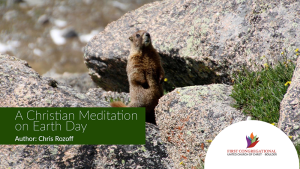Author: Tom Stiers
The President of the United Church of Christ (UCC), John Dorhauer, has written that the church is challenged to reach out to those on the margins. One of the so-called groups on the margins are those who define themselves as “spiritual but not religious.” I think this is one of the opportunities that he was writing about.
Now eight years into my retirement from active ministry I find myself favorably drawn to those who call themselves “spiritual but not religious.” Increasingly I find myself participating in conversations with many who feel comfortable with this description.
As I began to think about the topic, I reflected on the two terms…spiritual and religious in light of my faith journey.
Growing up on a farm in the Bible Belt of Midwestern America I was nurtured by the United Methodist Church. Through its Sunday School, preaching, and liturgy, I was led into a deeply spiritual journey. You recall that John and Charles Wesley both preached the value of a “strangely warmed heart.” This was taught and lived out by my Sunday School teachers who were elementary school teachers, local business men and women, a World War II hero, and the high school principal. We were led by preachers like Dr. Norbert Talbott and Rev. E. Stanley McKee who faithfully presented a message that instructed and encouraged those of us in the pews to deepen our spiritual lives. For me this became a Bible-centered faith lived out both in nature on the farm and in a growing awareness of God’s care for all people, all animals, and the earth.
Based on this foundation I sought ordination in the United Methodist Church with its bishops, district superintendents, a Book of Worship, and the Book of Discipline. Methodism offered order and structure to help worshippers experience a faith for their daily living and care for their neighbors around the world. I was drawn to that religious structure. So in 1961 after completing my first year at Union Theological Seminary I was ordained Deacon by the Indiana Conference of the United Methodist Church. Methodism had two stages of ordination – first as Deacon after one year of seminary and then as Elder after completion of seminary.
However, during my second year of seminary I was invited to be a part of the youth ministry of one of the larger churches in the United Church of Christ on Long Island. Here I discovered that I felt more comfortable being a part of a denomination that invited one to join “wherever you are, wherever you are on life’s journey, you are welcome here.” I came face to face with the fact that I wanted to be a part of a church that was free of a Book of Discipline and Bishops. So by graduation from seminary I sought to be ordained in the United Church of Christ. Quickly I discovered that the UCC also had its religious structures.
Looking back, I see the value of being “spiritual.” It enables me to know who I am, it helps me know my self-worth, and it helps me to continue growing. I feel a bond with those who describe themselves as spiritual not religious. I talk with them in my own family. Yes, I talk with them in the life of First Congregational. Many have an amazing inner awareness. They have learned the value of a “strangely warmed heart”. I learn much from them.
I understand the value of being “religious.” I need community. I find it mainly in the church: the Friday Men’s breakfast group, the weekly rhythm of a sabbath, the language of the liturgy, the renewing power of the hymns and the choir, the passing of the peace, thoughtful sermons, the weekly challenge to be involved in social justice, and connections to friends.
Are you “spiritual and not religious”? I am both!
I know the damage that the church has done by being over-zealous and judgmental. I am aware that people are busy with life and don’t want another place to go and pay attention. But I believe that some people have thrown the baby out with the bath water. Personally, I need the values of being both spiritual and religious.


